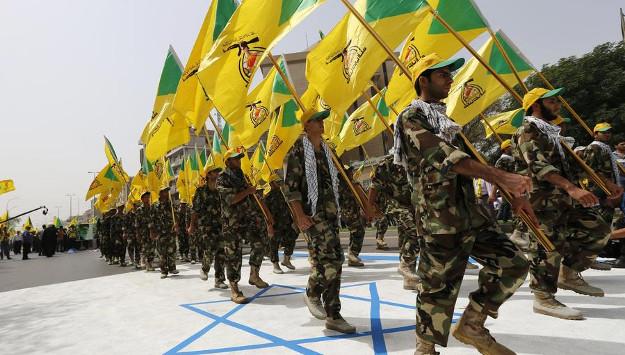In a bold statement reflecting the escalating tensions in the Middle East, Iraq’s Kataib Hezbollah has issued a warning to the United States regarding potential intervention in the ongoing conflict between Israel and Iran. As the geopolitical landscape continues to shift with heightened military and diplomatic maneuvers, the militia group, which is aligned with Iran, underscored its readiness to respond to any American involvement. This warning not only underscores the fragility of regional stability but also highlights the complexities of alliances and enmities in a region long enmeshed in conflict. Analysts suggest that Kataib Hezbollah’s stance may be a precursor to increased hostilities, potentially drawing Iraq into the crossfire of a larger power struggle that encompasses both Tehran and Tel Aviv. As tensions mount, the international community watches closely, concerned about the implications of a broader conflict spilling over into neighboring countries.
Kataib Hezbollah Issues Strong Statement on US Role in Israel-Iran Tensions
Kataib Hezbollah, a prominent Iraqi militia group, has issued a pointed warning to the United States, urging it to abstain from intervening in the escalating tensions between Israel and Iran. In a strong statement disseminated through various channels, the militia characterized any American involvement as an escalation that could lead to “dangerous consequences” for regional stability. The group emphasized that they are closely monitoring the situation and will take appropriate measures to respond if American forces make any moves deemed hostile in the context of this conflict.
The statement also reinforced the militia’s solidarity with Iran, declaring that any aggression towards its ally would be met with strong opposition. Key points from the announcement included:
- Resilience: Kataib Hezbollah reaffirmed its commitment to support its Iranian counterparts.
- Regional Security: The group called for a united front against perceived Western imperialist actions.
- Preparedness: The militia claimed to be ready to mobilize forces if U.S. interventions escalate further.
This rhetoric reflects a broader sentiment within various factions in Iraq and the region, emphasizing a growing anti-American sentiment amid fears that U.S. involvement could further destabilize an already volatile environment. As tensions mount, the influence of such militia groups will likely become a critical factor in shaping the future dynamics of the Middle East.
Regional Implications of US Intervention as Factions Rally Support
The ongoing tensions between the United States, Israel, and Iran have significant implications across the Middle East as various factions, including Iraq’s Kataib Hezbollah, rally their support bases and surface their stance against potential US intervention. Kataib Hezbollah, a powerful paramilitary group with close ties to Iran, has issued stern warnings, emphasizing that any direct involvement by the US could exacerbate the already volatile situation. This rhetoric not only reflects the group’s alignment with Iranian interests but also indicates a broader regional reaction that could inspire other militia groups across the region to take a stand. The following factors contribute to the rising tensions:
- Heightened military presence: A potential increase in US troops could spark retaliatory actions from Iranian-backed factions.
- Regional alliances: Countries like Iraq, Lebanon, and Syria might shift their affiliations based on the outcome of the conflict.
- Civil unrest: Rising anti-American sentiment could lead to demonstrations and violence within various countries aligned with the US.
Additionally, the situation has prompted a shift in diplomatic strategies among neighboring countries. Nations within the Gulf Cooperation Council (GCC) are reevaluating their positions, as a conflict on the Israel-Iran front can disrupt their security dynamics. Should the US choose to intervene, they risk inflaming sectarian divides, which could unleash unpredictable consequences. The following table highlights various factions’ potential responses to US actions:
| Faction | Potential Response |
|---|---|
| Kataib Hezbollah | Military action against US interests |
| Lebanese Hezbollah | Support for Iran through threats or active engagement |
| Iranian Revolutionary Guard Corps | Covert operations against US allies |
| Gulf States | Possible diplomatic distancing from the US |
Potential Pathways for Diplomatic Resolution Amid Escalating Hostilities
As tensions mount between Israel and Iran, the international community is grappling with viable strategies to temper the escalating conflict. Dialogue may serve as a pivotal approach to fostering understanding and reducing animosities. Engaging in multilateral talks involving key stakeholders, including major regional players and organizations, can help facilitate constructive discussions aimed at de-escalation. Among potential avenues are:
- Third-Party Mediation: Employing neutral countries or international bodies to broker conversations can provide a platform for both sides to air grievances and aspirations.
- Confidence-Building Measures: Initiatives such as ceasefire agreements and mutual respect for territorial sovereignty could lay the groundwork for deeper negotiations.
- Economic Incentives: Economic partnerships and aid from external powers could motivate parties to prioritize peace over continued hostilities.
Additionally, any attempt at a diplomatic resolution will need to address underlying issues, including historical grievances and territorial disputes that often exacerbate tensions. In light of Kataib Hezbollah’s warnings against U.S. intervention, it’s crucial for all involved to recognize the regional implications of their actions. Establishing a framework that emphasizes:
| Key Elements | Importance |
|---|---|
| Regional Security Arrangements | Promotes stability and mutual defense among neighbors. |
| Dialogue Platforms | Encourages ongoing communication to prevent misunderstandings. |
| Cultural Exchange Programs | Fosters people-to-people connections that may lessen hostilities. |
Through such collaborative efforts, the prospect for peace may emerge, paving the way toward a more stable geopolitical landscape. Diplomacy, if employed thoughtfully, can illuminate pathways away from the precipice of conflict and toward mutual respect and cooperation.
In Retrospect
In conclusion, the escalating tensions surrounding the Israel-Iran conflict have prompted a strong warning from Iraq’s Kataib Hezbollah, reiterating its stance against any U.S. intervention in the region. As the geopolitical landscape shifts, the implications of such warnings could reverberate throughout not only Iraq but also the broader Middle East. Observers are urged to consider the potential repercussions on regional security and international diplomatic efforts as both the U.S. and Iranian influences continue to play a pivotal role. As developments unfold, the international community watches closely, aware that the stakes are high, and the outcomes uncertain.














